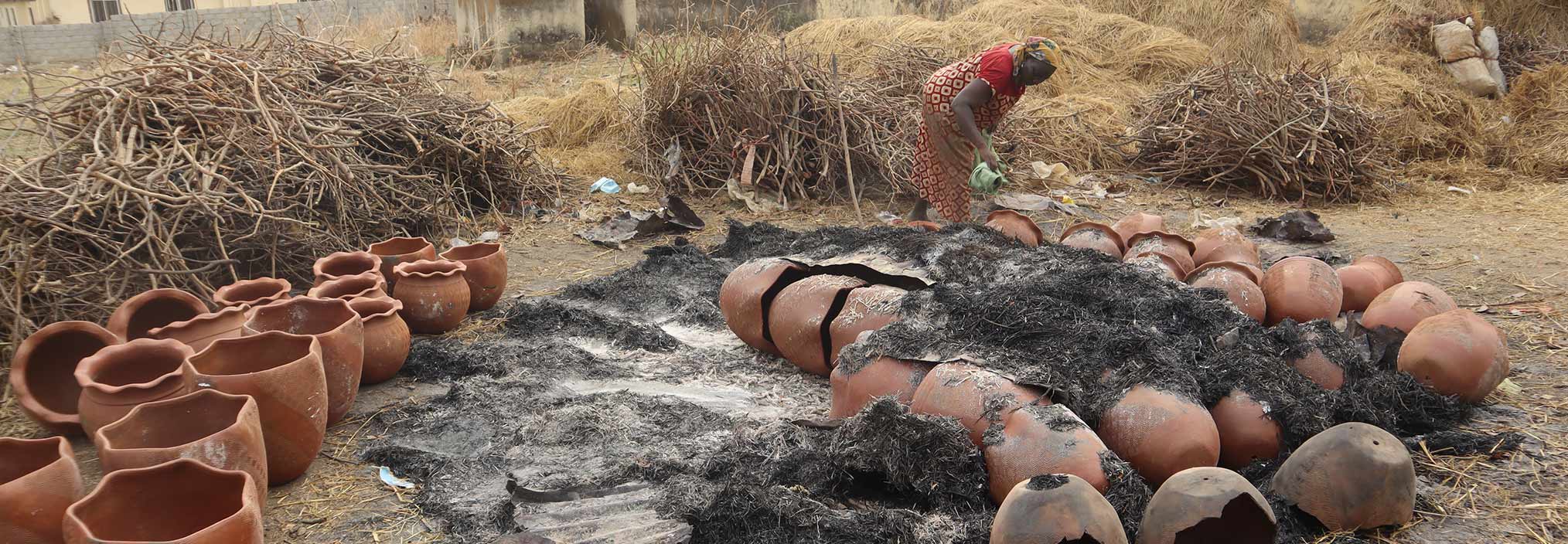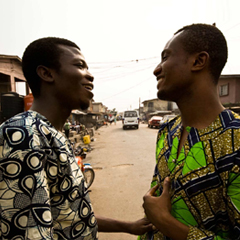The Resource Centre for Human Rights & Civic Education helps Abuja's Original Inhabitants advocate for their rights and secure government representation after decades of displacement and marginalization.
When the Nigerian government moved its federal capital to Abuja from Lagos in 1991, Original Inhabitants in the new capital viewed the shift as the beginning of their enhanced political, social, cultural, and economic development.
Instead, the move led to government seizure of Inhabitants’ lands and destruction of their homes without sufficient compensation, displacing thousands of people. Abuja communities and their Original Inhabitants began experiencing the federal government's neglect and social injustice, serious human rights violations, lack of government representation, and poor infrastructure.
Original Inhabitants’ protests to restore their land rights, political representation, and economic opportunities were met with violent repression and harassment, exacerbating their suffering and driving them further outside the margins of society.
Original Inhabitants’ protests to restore their land rights, political representation, and economic opportunities were met with violent repression and harassment.
“This is the struggle the Original Inhabitant had to embark on,” said Zikirullahi Ibrahim, Executive Director of the Resource Centre for Human Rights & Civic Education (CHRICED), a nonprofit established in 2006 to promote human rights, the rule of law, democracy, and accountability—and to strengthen the rights of Original Inhabitants.
Since then, CHRICED has made and continues making progress supporting Original Inhabitants’ capacity to influence government, while the organization strengthens efforts to raise awareness of corruption and implements projects to promote and protect citizens’ rights.
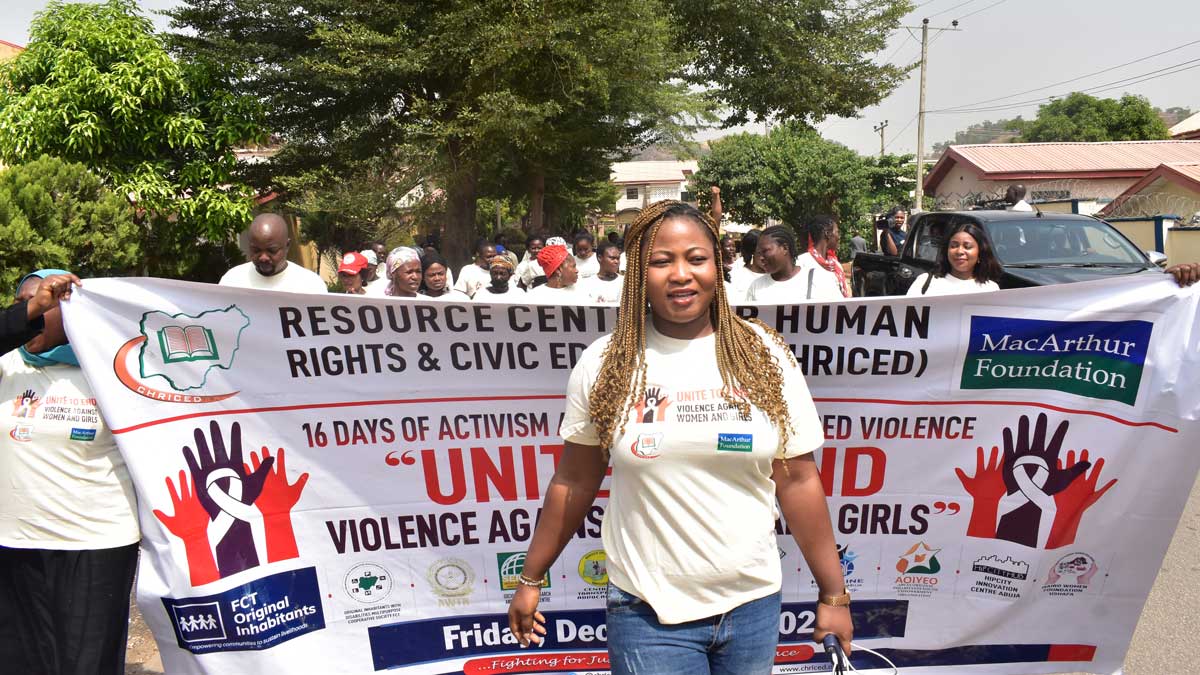
Progress Ajanaku leads an Original Inhabitant Cohort and Indigenous women at a CHRICED rally against gender-based violence in 2023. Credit: CHRICED
That work has included creating a lawyers' network, helping Original Inhabitants attain government positions, collaborating with local advocacy organizations to influence government action, and partnering with Indigenous organizations to improve women’s economic and educational opportunities.
“By and large,” Ibrahim said, “we are gaining momentum.”
Effective Advocacy
One example of that momentum occurred in 2021, when CHRICED helped Original Inhabitants set up a lawyers' network, which has enabled the Inhabitants to use effective messaging for their own advocacy, Ibrahim said. The network is comprised of the Senior Advocates of Nigeria (SAN)—an independent law practitioner integrity organization—and lawyers specializing in environmental and human rights.
CHRICED also created a journalist network to amplify Original Inhabitants’ issues across media outlets and voiced those concerns to the United Nations Expert Mechanism on the Rights of Indigenous People, held in June 2023 and July 2024 in Geneva, Switzerland.
Unlike Nigeria’s 36 states, Abuja is the Federal Capital Territory (FCT) and lacks a governor and House of Assembly. That structure suppresses Original Inhabitants’ representation in government.
“And their people are not being appointed into government offices,” Ibrahim said. “If you see any of the Original Inhabitants, they are either a cleaner or a clerk in the office.”
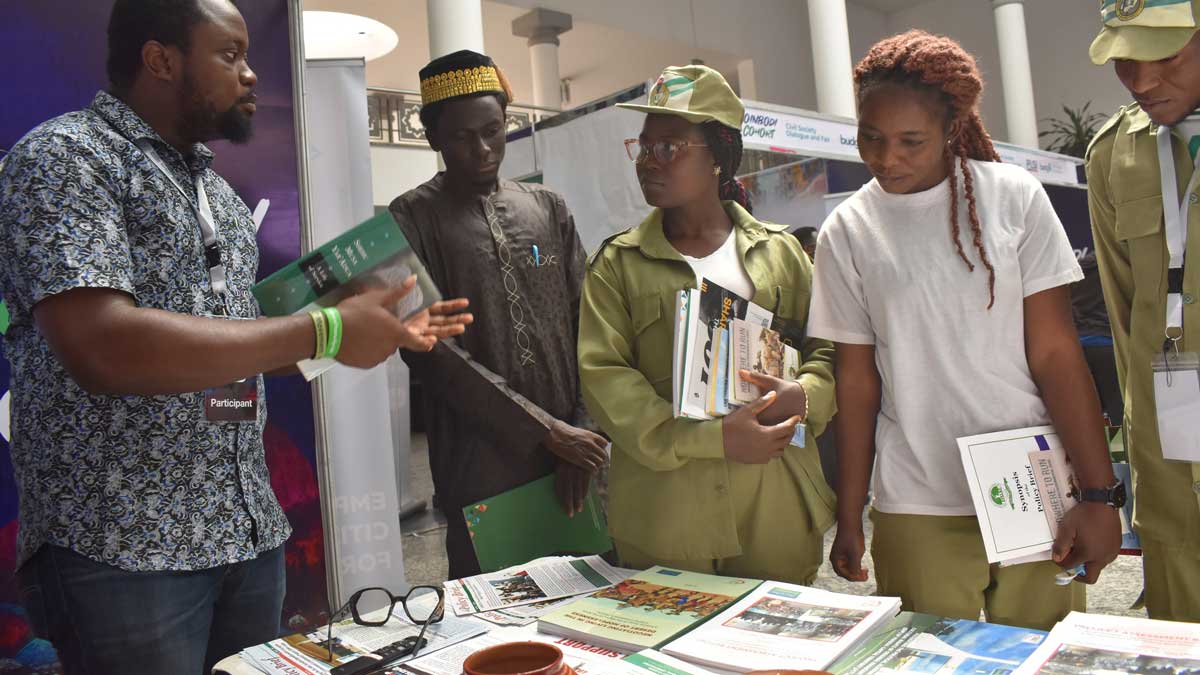
CHRICED Program Officer Abubakar Jaafar meets members of the National Youth Service Corps. Placing Original Inhabitants into government offices and agencies is a key part of CHRICED’s strategy. Credit: CHRICED
CHRICED visited government ministers and agencies to persuade them to select Original Inhabitants to staff government offices, a move that would address some of Original Inhabitants’ challenges and lead the government to channel development to their communities.
The advocacy is working.
For the first time, an Original Inhabitant, Zephaniah Jisalo, is a member of the current president's cabinet. In addition, an Original Inhabitant became a mandate secretary for local government and chieftaincy affairs, and another Original Inhabitant is the mandate secretary for the Secretariat for Youth and Development.
“Telling the story of the Original Inhabitants has resonated with almost everyone in the country.”
An Abuja Original Inhabitant, Grace Adayilo, also was appointed as a permanent secretary of a federal ministry, and recently promoted to Head of FCT Civil Service Commission.
“Telling the story of the Original Inhabitants has resonated with almost everyone in the country,” Ibrahim said.
Collaborating on Responsible Citizenship
To expand its advocacy work and strengthen Original Inhabitants’ capacity to influence government action on political, economic, and cultural injustices, CHRICED collaborated with local advocacy organizations by supporting them with subgrants.
The Center for Environmental Sustainability Development Awareness (CESDA) is one of the organizations CHRICED funded. In 2022, during the FCT Area Council elections, CESDA organized a grassroots voting seminar with the Abuja Original Inhabitants across the six Area Councils.
“CESDA enlightened us regional Inhabitants on the need to participate and engage in electoral processes right from the grassroots," said Francis Duzaho, an Original Inhabitant who participated in the seminar.
Duzaho joined CESDA and other Original Inhabitants in a door-to-door campaign educating people on utilizing voter rights and owning voter cards. The workers encouraged participants to vote during elections and reject vote buying.
“When you engage in vote buying, you are selling out your democratic rights.”
“Vote buying is evil,” Duzaho said. “When you engage in vote buying, you are selling out your democratic rights. You cannot come out tomorrow to challenge a leader for not doing what he is supposed to do in office when you know that he gave you money to bribe his way in.”
After the seminar, Duzaho organized a two-day workshop for the Abuja communities in the Bwari area on the dangers of vote buying. The workshop also encouraged young people to vie for political positions and push for accountable governance.
Crucial Training
CHRICED also partners with Indigenous organizations to make economic opportunities and education for women more accessible and equitable. Mairo Women Foundation Ushafa, which receives MacArthur support through CHRICED, is one example.
The foundation trains economically disadvantaged women in rural areas, equipping them with vocational and industrial skills, such as pottery making.
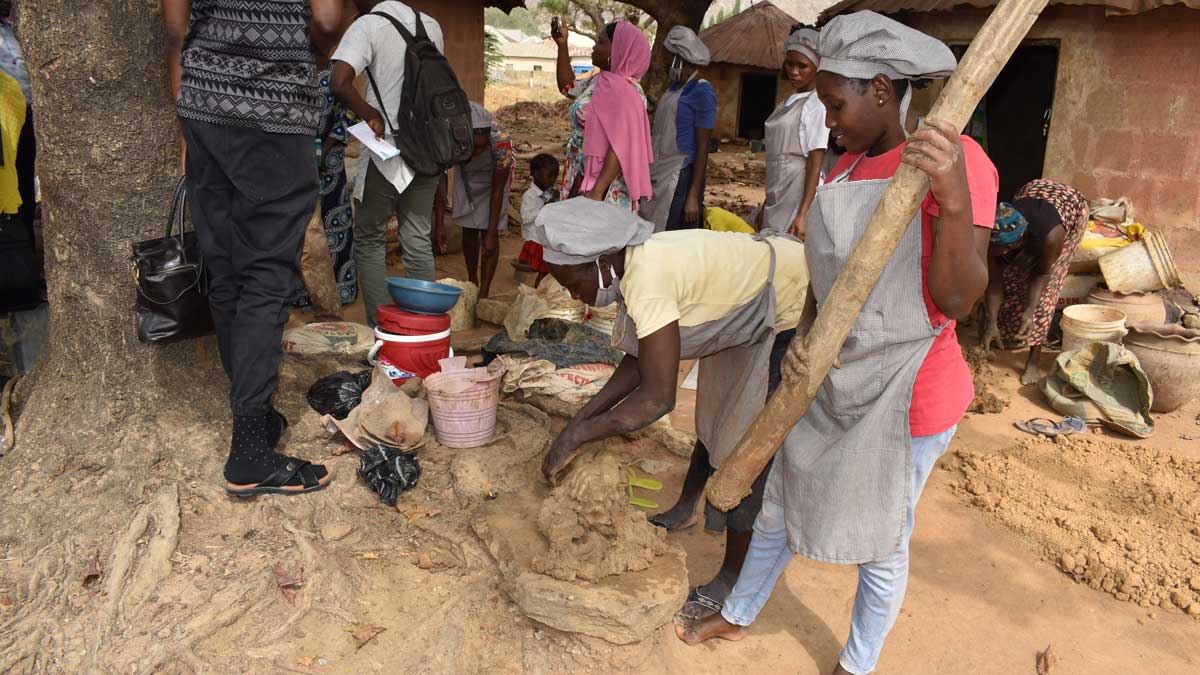
Two women work with clay at the Ushafa Cultural Pottery Center. Artisan training has made pottery a significant source of employment and income for Original Inhabitants. Credit: CHRICED
“I decided to open Mairo Pottery so that the youths can benefit from it and have something to do,” said Maryamu Barnabas, Executive Director of Mairo Women Foundation. “I am so happy because I have imparted knowledge to those who do not know the importance of pottery.”
Through that subgrant, the foundation has been able to train 500 Original Inhabitants in pottery making, which, in turn, has become a significant source of employment and income for Original Inhabitants.
“Some are making vases to help themselves survive,” Barnabas said. “I am so grateful to CHRICED for allowing Mairo to train the Original Inhabitants of FCT.”
Abigael Isa, who received pottery training in 2021 at the Bwari area council, said it made an important impact in her life.
“Without help, I wouldn't be who I am.”
“I know how to make beautiful beads on my own, which has helped me financially,” she said. “Now I can make flower vases for decorative purposes. Without help, I wouldn't be who I am.”
Ibrahim is optimistic about the growing impact of CHRICED, adding that continued work is crucial.
Better representation of Original Inhabitants in the Nigerian government remains a concern, he said. And sections of Nigeria’s constitution further alienate Original Inhabitants by not acknowledging them as Inhabitants or owners of the land in Abuja.
“Those sections must be amended,” Ibrahim said. “Until that is done, the plight of Original Inhabitants still hangs in the balance. The long battle is still ahead.”
From 2017 through 2023, MacArthur has provided $4.18 million to CHRICED to reduce corruption, enhance government accountability, promote social justice, and strengthen the participation of marginalized voices. Among other initiatives, MacArthur's support also promoted public education and community mobilization on COVID-19 and enhanced the capacity of Indigenous communities to achieve resilient growth following the pandemic.



